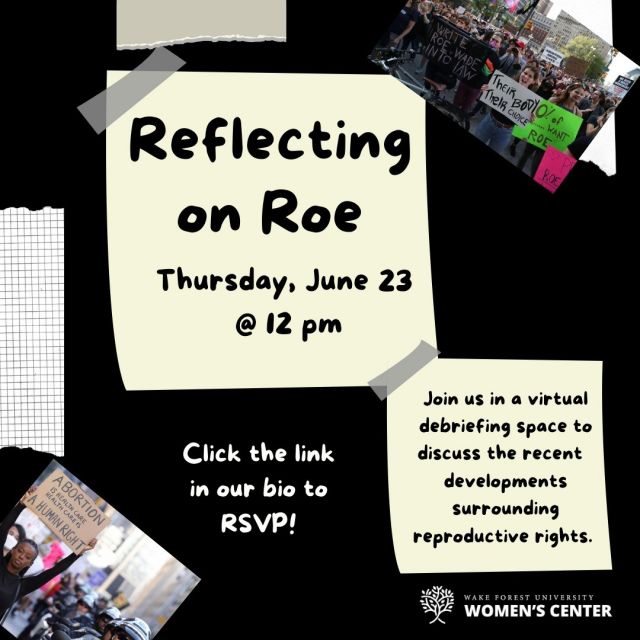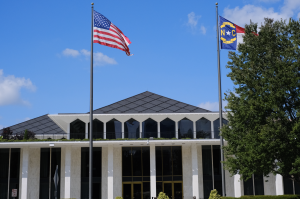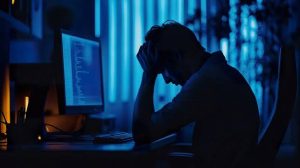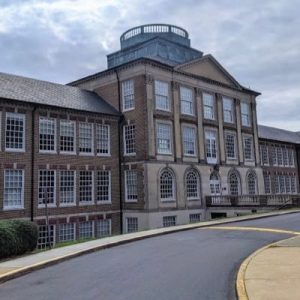Women’s Center hosts first “Reflecting on Roe” event
The event focused around the 1973 Supreme Court decision, which was overturned on Friday, June 24
Courtesy of the Women's Center
Participants in the event agreed that the overturn of Roe v. Wade would be devastating for bodily autonomy.
July 4, 2022
On Thursday, June 23, the Wake Forest Women’s Center hosted “Reflecting on Roe”, a virtual event designed to provide resources and accurate information related to the recent news on reproductive rights.
This pro-choice leaning, discussion-style event was created in response to the draft majority opinion overturning Roe v. Wade that was released by POLITICO in early May. Antayzha Wiseman, the program coordinator for both the LGBTQ+ Center and Women’s Center, and Deb Marke, the Assistant Director for Advocacy and Social Justice Education in the Office of Community Engagement, organized the event to provide an environment for students to safely discuss and reflect on the upcoming decision. The event, notably, was held the day before the Supreme Court overturned Roe, and another event is scheduled for July 6.
The event began with a presentation by Marke that educated attendees on Roe v. Wade and the potential consequences of its reversal. She began by describing Dobbs v. Jackson Women’s Health Organization, the case that initiated the Supreme Court’s reconsideration of Roe v. Wade. In this case, Mississippi asked the Court to uphold its constitutional ban on abortion at 15 weeks of pregnancy. Marke discussed the impact of these national changes in conjunction with the three Supreme Court justices recently appointed by President Donald Trump. She also highlighted the significance of trigger laws, or laws that went into effect immediately after the overturning of Roe, and the precedent Roe v. Wade set for other right-to-privacy cases.
“Legislators have started conversations about overturning Griswold v. Connecticut which provides constitutional protection for the right to access contraception,” Marke said. “Arguments about privacy in Griswold paved the way for same-sex marriage.”
Marke localized this national story by sharing North Carolina’s abortion policies and the ways that Roe v. Wade being overturned could affect the state.
“If Roe is overturned, abortions would not be immediately banned in North Carolina,” Marke said. “Republican state lawmakers in North Carolina are unlikely to pass a more restrictive abortion law that could escape Democratic Governor Roy Cooper’s veto. Though Republican lawmakers have a majority, it’s not a super-majority that would enable them to override a veto,” the presentation read.
Wiseman followed the presentation with a time for reflection. Participants shared their feelings and ways they have responded to the Supreme Court’s upcoming decision.
Pro-choice individuals in attendance were particularly concerned that overturning Roe v. Wade will disproportionately affect certain groups. According to Marke’s presentation, those facing systemic racism and those with limited access to health care would be hit hardest by the change. Another largely held concern is that it would set the precedent for other Supreme Court decisions to be overturned. Participants worried the right to contraception, same-sex marriage and personal privacy altogether could be threatened.
Participants concurred that overturning Roe v. Wade would be a devastating loss of bodily autonomy. To preserve the privacy of participants, specific quotes could not be shared.
To conclude the event, Marke and Wiseman provided a resource document to share ways students can stay engaged and act on their opinions.
The Women’s Center hopes to continue to be able to support the women on campus during this time.
“We’re going to continue to offer support around this, and we’re going to continue to offer places for people to debrief, share resources, learn from each other and learn from people who know more,” Wiseman said.
The Women’s Center’s official statement on the overturning Roe v. Wade echoed Wiseman’s words.
“We are here to support you as you navigate what this news means for you and your loved ones,” the statement read.












